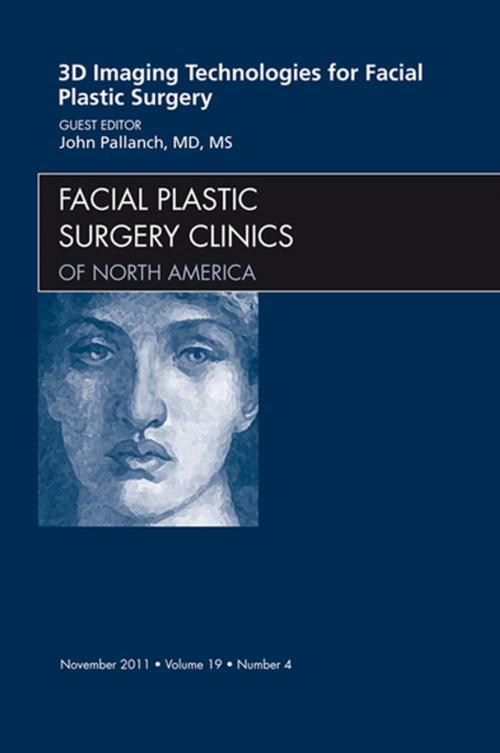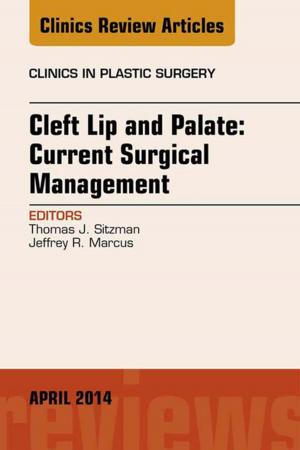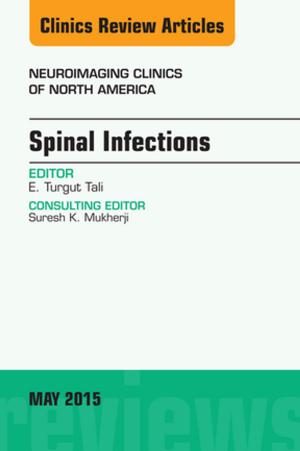3-D Imaging Technologies in Facial Plastic Surgery, An Issue of Facial Plastic Surgery Clinics - E-Book
Nonfiction, Health & Well Being, Medical, Surgery, Plastic & Cosmetic| Author: | John Pallanch, MD | ISBN: | 9781455712571 |
| Publisher: | Elsevier Health Sciences | Publication: | February 28, 2012 |
| Imprint: | Saunders | Language: | English |
| Author: | John Pallanch, MD |
| ISBN: | 9781455712571 |
| Publisher: | Elsevier Health Sciences |
| Publication: | February 28, 2012 |
| Imprint: | Saunders |
| Language: | English |
A global pool of surgeons and researchers using 3-dimensional imaging for facial plastic surgery present topics on: Image fusion in pre-operative planning; The use of 3D imaging tools including stereolithographic modeling and intraoperative navigation for maxillo-mandibular and complex orbital reconstruction; Custom-made, three-dimensional, intraoperative surgical guides for nasal reconstruction; The benefits and limits of using an integrated 3D virtual approach for maxillofacial surgery; 3D volume assessment techniques and computer-aided design and manufacturing for pre-operative fabrication of implants in head and neck reconstruction; A comparison of different new 3D imaging technologies in facial plastic surgery; 3-D photography in the objective analysis of volume augmentation including fat augmentation and dermal fillers; Assessment of different rhinoplasty techniques by overlay of before and after 3D images; 3D volumetric analysis of combined facial lifting and volumizing (volume enhancement); 3-D facial measurements and perceptions of attractiveness; Teaching 3-D sculpting to Facial Plastic Surgeons, 3-D insights on aesthetics; Creation of the virtual patient for the study of facial morphology; 3-dimensional video analysis of facial movement; 3D modeling of the behavior of facial soft tissues for understanding facial plastic surgery interventions.
A global pool of surgeons and researchers using 3-dimensional imaging for facial plastic surgery present topics on: Image fusion in pre-operative planning; The use of 3D imaging tools including stereolithographic modeling and intraoperative navigation for maxillo-mandibular and complex orbital reconstruction; Custom-made, three-dimensional, intraoperative surgical guides for nasal reconstruction; The benefits and limits of using an integrated 3D virtual approach for maxillofacial surgery; 3D volume assessment techniques and computer-aided design and manufacturing for pre-operative fabrication of implants in head and neck reconstruction; A comparison of different new 3D imaging technologies in facial plastic surgery; 3-D photography in the objective analysis of volume augmentation including fat augmentation and dermal fillers; Assessment of different rhinoplasty techniques by overlay of before and after 3D images; 3D volumetric analysis of combined facial lifting and volumizing (volume enhancement); 3-D facial measurements and perceptions of attractiveness; Teaching 3-D sculpting to Facial Plastic Surgeons, 3-D insights on aesthetics; Creation of the virtual patient for the study of facial morphology; 3-dimensional video analysis of facial movement; 3D modeling of the behavior of facial soft tissues for understanding facial plastic surgery interventions.















